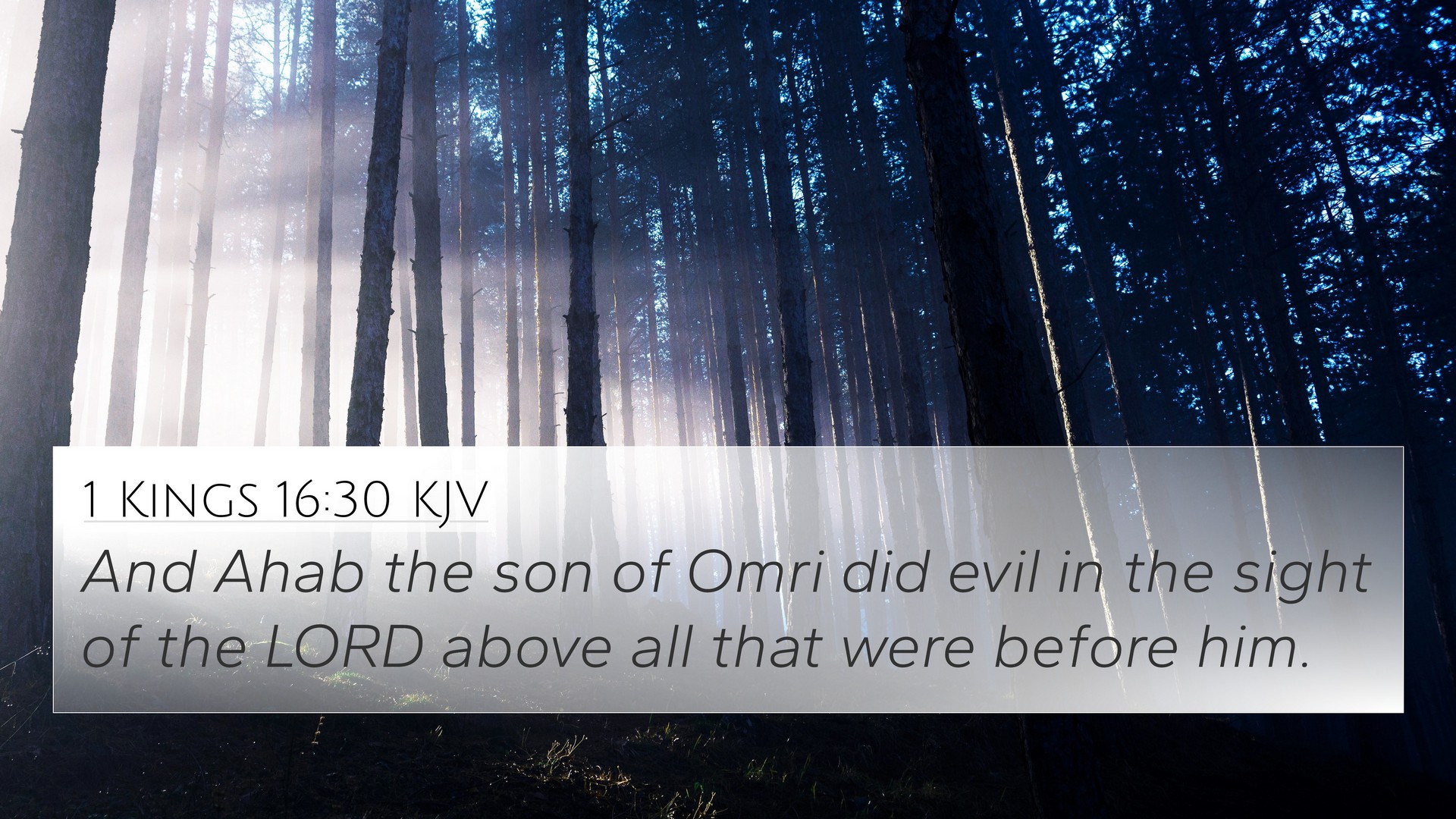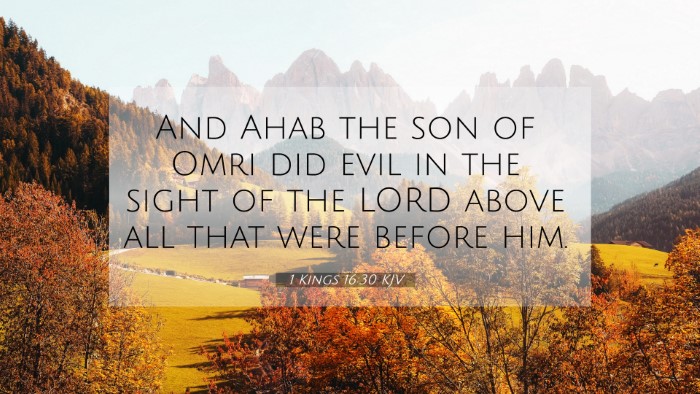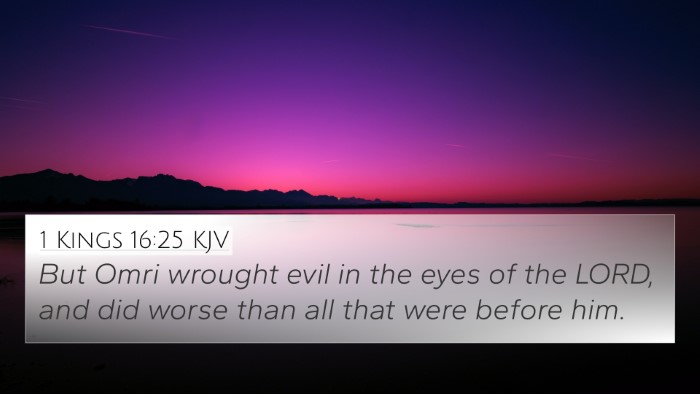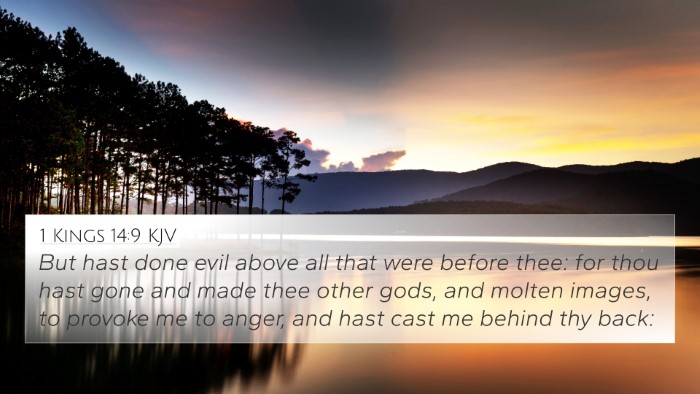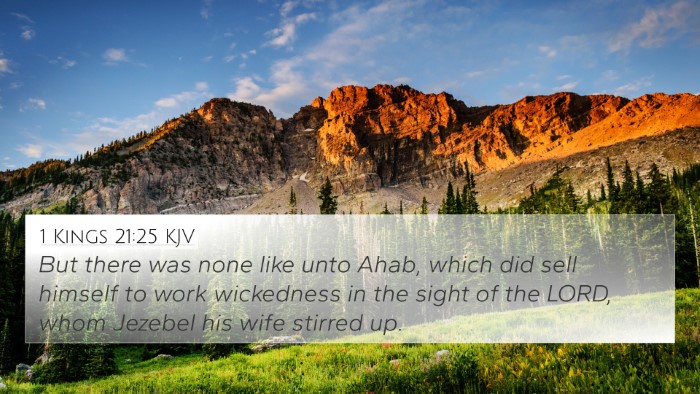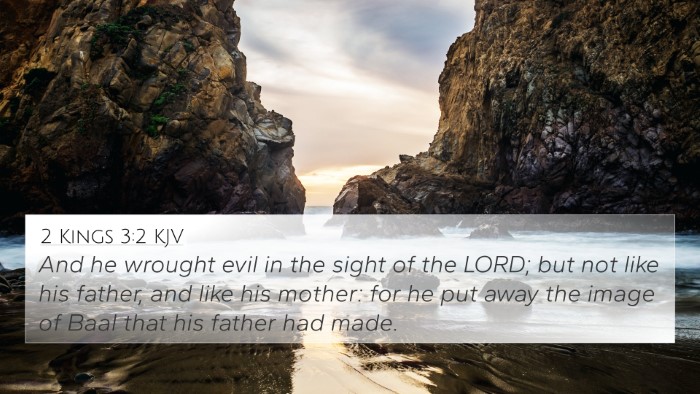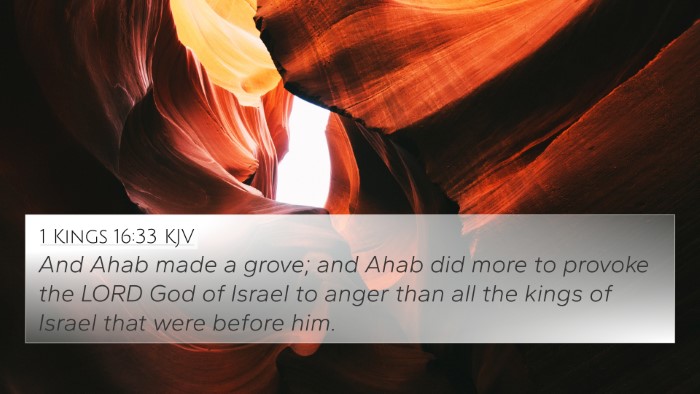Understanding 1 Kings 16:30
Verse: "And Ahab the son of Omri did evil in the sight of the LORD above all that were before him."
Summary of Meaning
The verse 1 Kings 16:30 highlights the reign of King Ahab, emphasizing his notorious wickedness as he led Israel away from the worship of Yahweh. This verse serves as a critical introduction to Ahab's character and his impact on the nation of Israel.
Commentary Insights
-
Matthew Henry:
Henry emphasizes that Ahab’s evil deeds were not only worse than those of his predecessors but were also influenced by his wife, Jezebel. He notes that Ahab’s actions were a fundamental departure from the covenant God had made with Israel, reflecting a broader decline in moral and spiritual integrity.
-
Albert Barnes:
Barnes explains the significance of Ahab's reign, providing context around the corruption of the monarchy and its alignment with Baal worship. Ahab's disregard for God's laws led to significant repercussions for Israel, illustrating the dangers of turning away from divine commandments.
-
Adam Clarke:
Clarke discusses the implications of Ahab’s rule on the nation. He notes that his character and decisions are foundational for understanding subsequent events in the Israelite history, particularly in relation to his opposition to the prophets of God. Clarke draws connections with how personal moral failure can lead to collective consequences for a society.
Connections Between Bible Verses
1 Kings 16:30 can be cross-referenced with several other verses that showcase the spiritual decline of Israel under Ahab's leadership and highlight the consequences of idol worship.
- 1 Kings 18:21: "And Elijah came unto all the people, and said, How long halt ye between two opinions? If the LORD be God, follow him: but if Baal, then follow him." - This shows Elijah’s confrontation with the people regarding their divided loyalty, stemming from Ahab’s influence.
- 2 Kings 21:16: "Moreover Manasseh shed innocent blood very much, till he had filled Jerusalem from one end to another; beside his sin wherewith he made Judah to sin, in doing that which was evil in the sight of the LORD." - This illustrates the lasting impact of Ahab’s policies on future kings and the perpetuation of evil.
- 1 Kings 14:9: "But hast done evil above all that were before thee, for thou hast gone and made thee other gods, and molten images, to provoke me to anger." - This verse provides a clear comparison to Ahab’s actions, stressing the ongoing trend of wickedness among Israel’s leaders.
- Micah 6:16: "For the statutes of Omri are kept, and all the works of the house of Ahab, and ye walk in their counsels; that I should make thee a desolation..." - Acknowledging Ahab's legacy and the continued following of his sinful ways by later generations.
- 1 Kings 16:31: "And it came to pass, as if it had been a light thing for him to walk in the sins of Jeroboam the son of Nebat, that he took to wife Jezebel the daughter of Ethbaal king of the Zidonians..." - This verse directly follows 1 Kings 16:30, further emphasizing Ahab's immoral choices.
- 1 Kings 22:52: "...for he did evil in the sight of the LORD, and walked in the way of his father, and in the way of his mother, and in the way of Jeroboam the son of Nebat, who made Israel to sin." - This highlights the continuation of Ahab’s legacy of sin.
- Revelation 2:20: "Notwithstanding I have a few things against thee, because thou sufferest that woman Jezebel, which calleth herself a prophetess, to teach and to seduce my servants..." - A spiritual parallel where Jezebel’s influence extends beyond Ahab’s reign into the New Testament, symbolizing false teaching.
- Galatians 5:9: "A little leaven leavens the whole lump." - This verse reflects the pervasive nature of sin, akin to Ahab’s actions leading Israel to corruption.
- Romans 1:18-32: - Explains the dangers of turning away from God, similar to what happened during Ahab’s reign as a nation turns to idolatry and faces judgment.
Thematic Connections
The account of Ahab’s reign invites readers to reflect on themes such as:
- The Corruption of Leadership: Ahab’s choice to align with idolatry serves as a warning about the responsibility of leaders to uphold divine standards.
- Faithfulness vs. Apostasy: The struggle between following God’s commandments versus succumbing to societal pressures and falsehoods is a recurring theme in scripture.
- Consequences of Sin: The verse serves as a reminder that turning away from God's ways has serious ramifications, both personally and nationally.
- The Role of Influence: Ahab's marriage to Jezebel illustrates how personal relationships can greatly affect faith and behavior within a community.
Conclusion
1 Kings 16:30 encapsulates a pivotal moment in the history of Israel, revealing the extensive impact of King Ahab's choices and character. Understanding this verse through various commentaries provides clarity on its significance and the interconnected themes throughout the Bible. By cross-referencing related scriptures, readers can deepen their understanding of the warnings and lessons embedded within the narrative.
Tools for Further Study
For those interested in exploring the connections between Bible verses and enhancing their study of scripture, consider utilizing:
- Bible concordance
- Bible cross-reference guide
- Cross-reference Bible study methods
- Comprehensive Bible cross-reference materials
